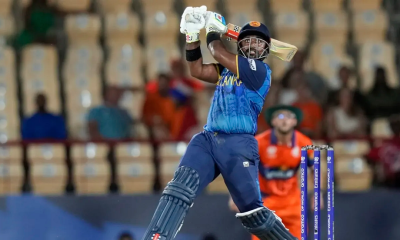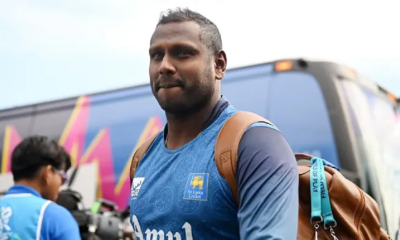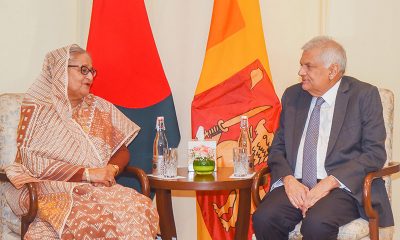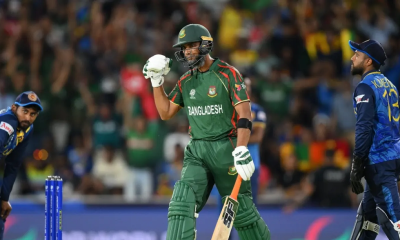Opinion
Grow the economy, stupid!
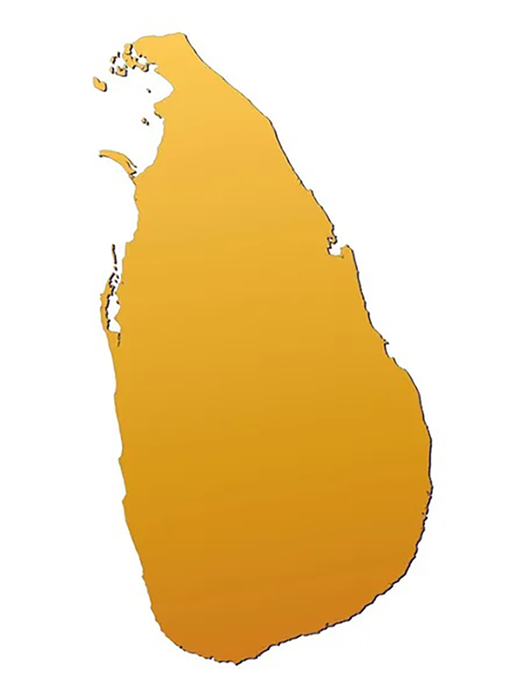
Sri Lanka needs to get back to growing its economy. It needs a new push towards development, one that harnesses good ideas and creates wealth for all its citizens. The name of the game is wealth creation – for all. Then governments will have something to tax! But somehow, little Sri Lanka hasn’t quite grasped this idea, but is quite happy to sell off the family silver, i. e., high value engineering installations, to anyone with money. But this portrays the feebleness of the Sri Lankan leadership.
Older Sri Lankans hold up the fine example of Lee Kwan Yu and how he exploited Singapore’s geo-political advantages and brought the whole population out of poverty and into some kind of prosperity. Sri Lanka should do the same. and we are lucky, we have a very rich neighbour in India, who is quite willing and anxious to help us, or so it seems.
All around the world there are countries with money which are willing to trade with us. Saudi Arabia is the finest example of a marketeers’ paradise. Other countries are: South Africa, Brazil, China and not least, Russia. Sri Lanka needs to identify countries either with cash or in need of our products. I suggest Sri Lanka identify such countries having cash and to study how to service their needs.
Iran has produced their BAYRACTOR drones, and they are a great success in the war in Ukraine. These drones have many uses: data collection, identifying enemy positions and fortifications, giving out precise locations of enemy for tank targeting, and even to deliver a couple of kilos of High Explosive to where it is needed, on or off the battlfield! That is, they are adaptable and proven. They have been tried and tested on the battlefield and have come out with flying colours so to speak!
Countries like to know what their neighbours are up to and so Iran has a full order book. Therefore, the manufacture, testing and selling these drones is a huge success and a money-making enterprise for the Iranians! Is there any way we can help them with their production or innovative designs?
Sri Lankans need a similar manufacturing success, something that is useful that people are willing to buy. They say ‘build a better mousetrap and people will beat a pathway to your door.”
Sri Lanka used to have a barbed wire manufacturing plant. Can this manufacturing be revived and put to work? Perhaps barbed wire and other types can be exported all around the world. That presents a whole new world of boundless possibilities!
Russia supplies most of the metal palladium in the world. Palladium is a metal used for making exhaust pipes for environmentally clean cars. Germany’s Mercedes car manufacture is just one example from the whole car manufacturing industry in Europe! With sanctions biting deep into Russia’s economy the export of this metal has been curtailed or even stopped entirely. Perhaps little Sri Lanka can persuade Russia to supply this metal which then could be used for exhaust pipe manufacture and export pipes for all those car manufacturers in the west.
To refresh: Sri Lanka needs to initiate manufacturing products that it can sell overseas and raise money to reduce its debts.
Russia, India and China are all developing large power generating stations – either run on Uranium or on Thorium. Uranium has been used to generate electricity for many years and there is a whole regulatory system in play which steers new projects in that direction, whereas Thorium, a safer, better, cheaper, less polluting way of generating power is side-lined. But that is just plain wrong thinking.
Thorium is four times more abundant than Uranium; it cannot be used for making weapons. A Thorium powered generation plant has run successfully for 22,000 hours. Thorium is cleaner to mine; it eats actinides and creates isotopes which are valuable such as Bismuth 213. It has no pressure for a sudden release event = no explosions. The reactors are safe by design, with automatic shutdown nothing can melt. It uses or burns 99% of its Thorium fuel. There are zero greenhouse emissions, and no coolant water required. It is scaleable – it can be made large or in small units. It is claimed that the capital costs are the same as a coal fuelled power station, proportionately. There are useful commercial by-products apart from Bismuth 213. But because it is new territory – no one will take the risks – except perhaps Russia.
Two small Thorium driven plants could be installed on opposite sides of a town.
This would do away with the need for transmission cables and support towers. It would be a big saving in capital costs – but vested interests would oppose this innovation!
There is the unspoken threat of a repeat Carrington Event from the SUN which blasted the existing (at that time) electrics and electronics into combustion and ruination. And it is expected to happen again. The SUN is unpredictable and very dangerous for us. We should prepare for these events or expect to be blasted back to the stone age. Are you ready for that?
This reasoning lays the foundation for future Thorium development as a source of energy.
Russia is currently offering little Sri Lanka a small powerplant using Uranium for generating heat. But the consequences of reducing or elimination the import of dirty, polluting coal is not interesting to the Sri Lankan leadership.
A further example of innovation is the use of the metal – tungsten carbide. It is well known for use as tool bits in cutting and shaping softer metals in workshops. In the latest example of innovation it is being used as shell casing for smart weapons and shells because it can penetrate concrete easily and even be used to destroy tanks. Depleted uranium is used by the United States army for its tanks but has residual but dangerous radiation. The Russians do not go down that dirty, polluting path.
Can Sri Lankans find another use for extremely hard tungsten carbide?
Let inventive, Sri Lankan minds roam around looking for new applications.
Priyantha Hettige
Opinion
Why Bachelor of Arts and no Spinsters …, LSE degrees and titles, again?

Three matters concerning universities. The eminent botanist Dr. Upatissa Pethiyagoda asked (17/12) why there were Bachelor of Arts degrees and no Spinsters …. degrees. When universities were first founded in medieval times, the intelligentsia was almost entirely churchmen: priests, friars and monks. There were no women in the clergy. Churchmen held power in studium generale which about the 15th century came to be called universities.
Universities governed themselves, a common feature of many organisations in medieval Europe, where authority was fragmented. (The seeds of present claims for autonomy in universities, bolstered by new and other powerful factors, lay there.) Although graduates from the Arts Faculty comprised the overwhelming majority in universities, and the arts faculty was fons et origo ceteris (source and origin of all others), graduates of the Faculty of Theology controlled universities. For centuries to come this practice continued. The church and, more recently, laymen who governed universities, did not permit the admission of women to universities. In Dr. Pethiyagoda’s university in the UK, women were formally admitted to degrees only in 1948! In Oxford, women had been admitted in 1920-21. That explains why there are no “Spinster graduates”, even though, in some universities, women comprise the majority that graduates. However, change has been rapid since then. The present vice-chancellor of Cambridge University is a woman. The Master of Trinity Hall, one of the smaller but older colleges in that university, is a woman who was an academic in the US, previously.
Then it was asked whether LSE could offer a degree (in The Island, on the same day). LSE cannot, because it is not a university but only a School at the University of London, like the Imperial College of Science and Technology, King’s College or SOAS. Similarly, one cannot get a degree from the Harvard Business School. The model of the University of London was copied in India, when the British established universities there in 1857, the year of the mutiny. (Ramachandran Guha once remarked that two mutinies began in 1857; the other being the establishment of universities whose alumni were a force in pushing the British out of India.) As a result, Delhi University or Calcutta University has large numbers of colleges, where standards of teaching vary widely. The University of Bangalore is reputed to have hundreds of affiliated colleges.
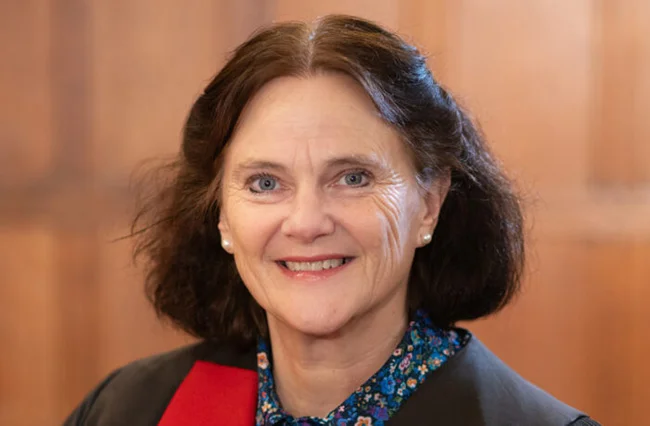
Professor Jan-Melissa Schramm became Vice- Master of trinity hall on 1 april 2023 after filling the role of acting Vice-Master during Lent term 2023. She is Professor of Literature and Law in the english Faculty, Director of Studies in english at trinity hall, and was Deputy Director at CRaSSh between 2017 and 2020. (From Trinity Hall official website)
P. A. Samaraweera, philosophiae doctor, (20/12/24) insists on calling a university degree a title: ‘…(PD) is incorrect in his analysis of a Ph.D. as a title’. Well, of course, Alice (in Wonderland) retorted, ‘I mean what I say’ and Dr. Samaraweeera may assert that same privilege. But korala, muhandiram, maha mudali, professor, archdeacon and judge are titles, not university degrees. B.A., D.Phil., and D.Litt. are degrees and not titles. His appellation ‘Dr.’ is not a title, whereas he may hold the title ’professor’. I went back to history to explain what it is, not what the future should be. He might find it difficult to explain why he, a chemist (say) holds a degree ‘doctor of philosophy’, having never, even in school, studied philosophy. The explanation is in the history of universities. Well into the 21st century, President Emmanuel Macron, a few months ago, opened the University of Paris-Saclay and it will have deans, provosts, and other office holders whose titles derive from the University of Paris which started about 1210 CE. Robert Grosseteste, Bishop of Lincoln, Chancellor of Oxford, in the 14th century, had he miraculously been transported to the occasion, may have found the entire setup familiar as he was ‘a French poet, an agriculturist, a lawyer, a physician, and a preacher; ….’ ( Rashdall, Vol.III p.241). He may even have understood the proceedings. Modern universities follow procedures adopted in old Europe: wear your cappa (degree gown and cap) and compare those vestments with what a Catholic priest, a bishop or the pope wears. Need I say more?
Philosophiae Doctor
Opinion
Going easy on Year 5 Scholarship trial
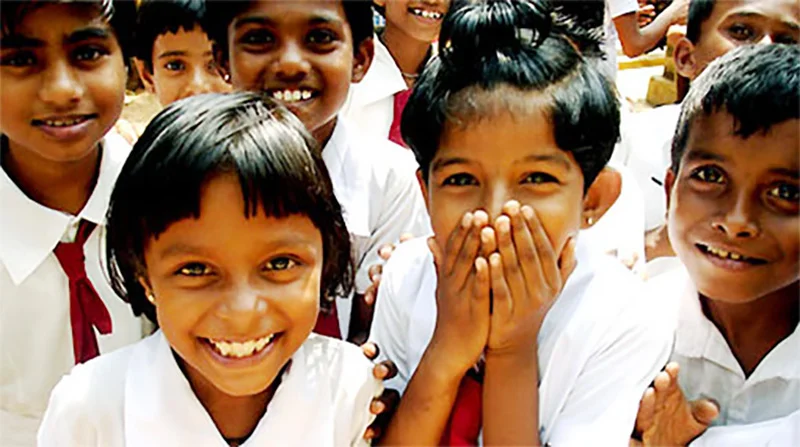
“The goal of education is not to increase the amount of knowledge but to create the possibilities for a child to invent and discover”
– Jean Piaget
“[They] are confined for four or five years in small cages, being kept in the dark and not allowed to set foot on the ground”. One might wonder whether the foregoing sentence is one which is meant to serve as a metaphorical description of the joyless life of most of our primary-level students, who are regimented for two to three years to face the Year 5 Scholarship exam. Well, no.
It doesn’t have the remotest connection to modern-day exams or an education system unwittingly designed to drain childhood of its inherent pleasures. It refers to a custom, a ‘persecution’ ingrained in primeval cultures, the remnants of which may still be found in many societies including ours. The quote is from a well-known book on anthropology, “The Golden Bough: A study in magic and religion” written by Sir James Frazer. The sentence describes a widespread taboo in primitive societies, which resulted in the “seclusion of girls at puberty”. However, it is a pity that today, one is likely to see in it, at least a faint reference to the otherwise happiest period of our youngest citizens, who are pressured to prepare for an exam, which is superimposed, for reasons unrelated to the goals of education, per se. Rather, it is designed to make tens of thousands of underprivileged children work harder than they reasonably can, because the successive governments have not been able to provide the required infrastructure facilities to their schools to enable them to continue studies till they enter the tertiary level. In other words, the well-known exam is an instance of making our children sacrifice their childhood till the rulers, if they ever will, set right the larger economic wrongs.
Whereas, in ancient times, young girls were made to carry the burden of superstition and patriarchy, today young children of all sexes are forced to pay the price for political and economic bungling. Ultimately, a problem resulting from lack of opportunities for many, is upgraded and embellished as ‘providing opportunities’ for the few ‘smart’. And, its grand title is Year 5 Scholarship Exam. What we conveniently forget is that this ‘exam’ is a wrong medicine produced to compensate for political quackery, which justifies the continuation of substandard education for the ‘condemned’ majority. It seems that the onward march of human progress, while doing away with cultural wrongs, is shy of getting rid of economic wrongs. A local saying seems apt here – one may say that the Year 5 scholarship exam has been serving as a metaphor for an annually produced loincloth expected to cure politically induced child-diarrhea.
The reported leaking of three questions from the Grade 5 scholarship exam held this year and the reports of such incidents in the past show its undesirable influence on the children, parents and other vested interests. At least, it has raised an unhealthy spirit of competition considerably removing the sense of joy which should be an essential part of these children’s learning experience. This is particularly relevant because the exam has drawn both students and their parents into a prolonged spell of obsession, which has severely undermined the importance of leisure and fun that should be part and parcel of a wholesome childhood. The prolonged fixation on the exam results tied to their ‘future success’ robs these fledgling scholars of the joys of ‘free learning’, which should otherwise give them that vital sense of adventure and excitement in gaining new knowledge. Bertrand Russell’s quote, “There is much pleasure to be gained from useless knowledge”, which refers to the unplanned learning pursuits that may enhance the quality of life of adults, may not be totally irrelevant in any discussion on child education.
As history and anthropology bear evidence, children have always been defenceless against many of those well-meaning programmes imposed on them by adults. It is a pity that today the parental ambitions triggered by social forces, have invaded and highjacked the childhood of our clueless kids. Particularly vulnerable are those underprivileged children who form the majority. Whereas the children of privileged families enjoy the freedom of engaging in many leisure pursuits while receiving their primary level education without undue stress, a large number of children belonging to the lower strata of society are grievously saddled with the scholarship exam to the exclusion of all fun and recreation.
As Ms. Ruth Surenthiraraj highlights in her article titled, “A case for the non-essential” (Kuppi Talk) published in The Island of December 10, “…entertainment, leisure, or the space to create is often perceived as being directly and positively correlated to being able to afford either the time or the resources to enjoy it”. This is a valid critique of a smug social attitude, which tends to give credence to the warped idea that the underprivileged in society may ‘prudently’ forget about entertainment. Reducing childhood to a strenuous struggle for future success is sad. And, any programme relating to education or otherwise, which, directly or indirectly, helps consolidate the idea that deprived children may ‘wisely’ shun any entertainment ‘for their own good’ can be nothing short of catastrophic.
Susantha Hewa
Opinion
Christmas Roots and Hearts Aglow:

Rekindling Faith, Peace, and Love Below…!
(Practical Tips for Christmas Bliss)
by Rev. Fr. (Dr.) Eymard Fernando
Bishop’s House, Kurunegala.
In an increasingly and incredibly materialised and commercialised world today, the core meaning of Christmas often seems distorted, being overshadowed by consumerism, bustling sales, and extravagant festivities. Yet, at its heart, Christmas is a season meant for reflection, change, love, and unity – a time when people gather to celebrate gratitude and generosity centred around the Divine Baby. As we explore the roots of Christmas and what it can mean for us in today’s world, we uncover themes of faith, hope, peace, and kindness that transcend religious boundaries, reminding us of the true purpose and value of God becoming man.
Therefore, let us delve a little into the origins and deeper significance of Christmas, exploring ways to return to these roots through themes of generosity, togetherness, and humility. By rediscovering these essential values, we can certainly celebrate Christmas as a season that brings light and life to our world.
A Season of Faith and Reflection
Christmas has its origins in the Birth of Jesus Christ, a moment celebrated by Christians as the arrival of hope and salvation. However, even beyond its religious significance, Christmas season has become a time when many reflect on themes of love, hope, and renewal. The story of the Nativity conveys universal values: humility, peace, and the power of hope.
The Birth of Jesus in a humble manger represents a profound lesson about simplicity and compassion. As theologian Henri Nouwen noted, “Jesus was born in the least expected place to the least expected people in the least expected way.” This simplicity, intertwined with humility, challenges the commercialised image of Christmas today. Instead of focusing on luxury and excess, the roots of Christmas invite us to value the simple, meaningful aspects of life: faith, family, and fraternity.
In today’s world, we can return to these roots by setting aside time for personal reflection during Christmas. Practising gratitude, being mindful of those less fortunate, and reaching out to loved ones are all different ways we can honour the spiritual foundation of Christmas. Thus, we all can benefit from a moment of stillness and introspection during this busy time of the year.
The Spirit of Generosity and Compassion
Christmas has always been a season of sharing, inspired by the gifts of the Magi to the Christ- Child and later, Saint Nicholas’ acts of charity as santa claus. However, the tradition of sharing has gradually shifted from simple acts of kindness to an intense focus on material gifts. According to American sociologist Juliet Schor, “We give to show love, but in a culture that equates love with spending, our giving has been commercialized.”
However, in recent years, a shift towards alternative, meaningful sharing has gained momentum in the form of a worthy ‘retromarch’. Many individuals and families now choose to give to charity in a loved one’s name or to offer experiences rather than material goods. This form of sharing very much aligns with the true spirit of Christmas, embodying generosity without extravagance.
Likewise, local initiatives, such as community food drives and clothing and toy collections, have become popular ways to give back. Participating in these efforts allows people to connect with others in their communities, creating a shared sense of purpose and compassion. As Mother Teresa famously said, “It’s not how much we give, but how much love we put into giving.” By focusing mainly on the intention behind our gifts, we can bring the spirit of Christmas alive in our own hearts and communities. However, the magic of Christmas is not very much in presents and parties, but in His Presence!
Family and Togetherness: A Time for Connection
The Christmas season is often one of the few times in the year when families come together, setting aside time to reconnect, reflect, and celebrate. This emphasis on togetherness is deeply rooted in the season’s traditions, dating back to ancient winter solstice festivals where communities gathered to share warmth and light during the darkest days of the year.
In modern times, when families may be dispersed across cities or even continents, Christmas remains a crucial opportunity to reconnect. This communal emphasis shows how Christmas, regardless of religious affiliations, has become a unifying tradition centred on family.
Simple traditions – like sharing a meal, decorating a Christmas tree, or singing carols together – allow families to pause, connect, and create memories. These rituals not only strengthen family bonds but also convey the essence of Christmas for younger generations. As American author Richard Paul Evans, best known for his inspirational and heartfelt novels says, “The smells, tastes, and sounds of Christmas are the roots that nurture a family tree.” By focusing on togetherness, Christmas serves as a reminder of the love and connection that sustain us all throughout the New Year.
Peace on Earth: Seeking Unity in This Divided World
One of the most significant messages of Christmas is the call for ‘Peace on Earth’. Yet, today’s world is marked by political, social, cultural, economic and various other divisions, making the pursuit of peace and unity more relevant than ever before. From the hymn ‘Silent Night’ to the angels’ proclamation of peace, Christmas has long symbolized hope in times of conflict.
A poignant historical example of Christmas promoting peace is the Christmas Truce of 1914, during World War I. British and German soldiers, entrenched on the Western Front, laid down their arms on Christmas Eve to exchange greetings, sing carols, and share small gifts. This unexpected truce, though brief, reminded soldiers of their shared humanity amidst the horrors of war. It symbolised the power of Christmas to transcend differences and bring people together, even during a time of darkness and death.
Today, peace-oriented traditions continue to play an important role during Christmas season. Interfaith gatherings, community meals, and charitable events all serve as spaces for people from different backgrounds to connect and understand one another. In a world often divided by ideological and political differences, Christmas can become a season with a reason for open dialogue, compassion, and understanding. Embracing Christmas’ call for peace and unity allows us to honour its roots in ways that resonate with our global context.
Practising Simplicity and Mindfulness
While Christmas has grown as a metaphor for lavish celebrations and enchanting tamashas, the season’s roots actually encourage simplicity and mindfulness. The traditional story of Jesus’ Birth in a manger speaks to a humble beginning, one that invites us to cherish what truly matters in life. Embracing that simplicity allows us shift our focus from material abundance to the richness of shared experiences.
In recent years, minimalism and mindfulness have gained popularity as antidotes to the consumer-driven spendthrift lifestyle with a ‘shop till you drop’ psychosis. Many people now opt for simpler, handmade gifts or choose to forgo elaborate decorations in favour of natural elements. These preferred choices reflect a desire to connect more authentically with the true meaning of Christmas. Instead of flashy lights or mountains of gifts, families can create meaningful memories through acts of kindness or spending quality time together strengthening family ties. One modern example for this is the ‘Reverse Advent Calendar’ tradition. Instead of receiving a treat each day, participants place an item – such as dry rations or clothing – in a box to donate to those in need. This practice helps to instil gratitude and generosity, shifting the focus from consumption to community service. By embracing a simpler and more mindful and meaningful approach, we honour the humble roots of Christmas and foster a deeper sense of appreciation for life’s countless blessings.
A Journey of Rediscovering…
 Returning to the roots of Christmas is a journey of rediscovering faith, kindness, and togetherness in a world that often moves at a very rapid pace. The true spirit of Christmas calls us to reflect on values that transcend time and culture: humility, compassion, peace, unity, and love. In embracing these themes, we transform Christmas from a season of materialism into one pregnant with meaning.
Returning to the roots of Christmas is a journey of rediscovering faith, kindness, and togetherness in a world that often moves at a very rapid pace. The true spirit of Christmas calls us to reflect on values that transcend time and culture: humility, compassion, peace, unity, and love. In embracing these themes, we transform Christmas from a season of materialism into one pregnant with meaning.
As we celebrate Christmas this year, let us remember that this event is not about what we have, but about who we are with and how we make others feel. It is a season of opening our hearts and minds to others, of putting love into action, and of finding moments of peace and tranquility in the midst of cacophony, disorder and chaos. By going back to the roots of Christmas, let us therefore invite joy, hope, and kindness into our lives, allowing Christmas grow and glow with renewed purpose and profound meaning resulting in a new birth in our own lives!
-
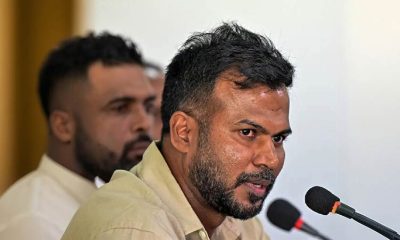
 Sports7 days ago
Sports7 days agoSri Lanka to mend fences with veterans
-

 Sports5 days ago
Sports5 days agoPathirana set to sling his way into Kiwi hearts
-
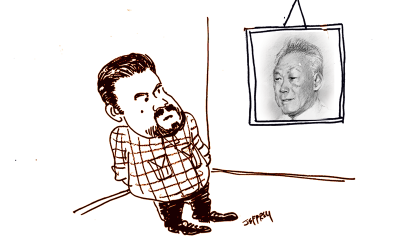
 Opinion7 days ago
Opinion7 days agoIs AKD following LKY?
-
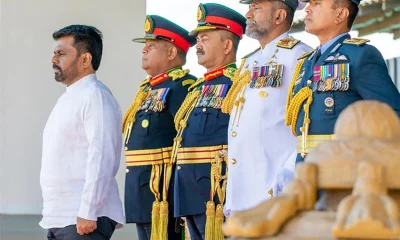
 News3 days ago
News3 days agoOffice of CDS likely to be scrapped; top defence changes on the cards
-
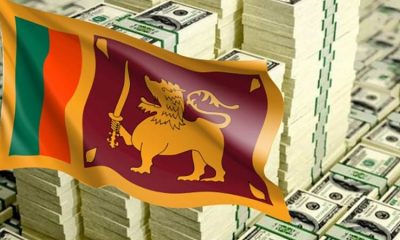
 News6 days ago
News6 days agoSL issues USD 10.4 bn macro-linked bonds
-

 Opinion7 days ago
Opinion7 days ago‘A degree is not a title’ – a response
-

 Editorial6 days ago
Editorial6 days agoRanil’s advice
-

 Editorial7 days ago
Editorial7 days agoLest watchdogs should become lapdogs


